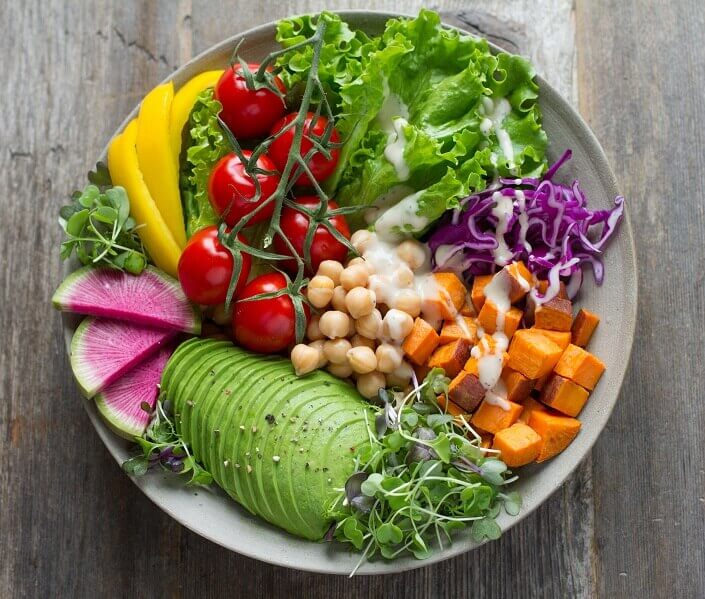7 mins read
Pregnancy Diets: Foods To Eat & Avoid

Maintaining a healthy diet during pregnancy is crucial for both you and your baby. A nutritious diet can provide essential nutrients that are required for your baby’s development.
Some of the benefits of a healthy diet during pregnancy include:
- Proper growth and development: A healthy diet provides the necessary nutrients for your baby’s growth and development, which can help prevent birth defects and other complications. You can find out more about what nutrients are important further down this article.
- Reduced risk of pregnancy complications: A balanced diet can help prevent pregnancy complications such as gestational diabetes, high blood pressure, and preterm labour.[1]
- Improved maternal health: Eating a nutritious diet during pregnancy can help improve your health, reduce the risk of anaemia and other nutrient deficiencies, and support healthy weight gain.
- Better long-term health outcomes: A healthy diet during pregnancy can have long-term health benefits for both you and your baby, reducing the risk of chronic conditions such as obesity, diabetes, and heart disease.
Essential Nutrients for Pregnancy
Folic acid
Folic acid (also known as Folate and Vitamin B9) is critical for the development of your baby’s neural tube, which forms the brain and spinal cord. The NHS recommends you take 400 micrograms of folic acid every day before you’re pregnant up to week 12 of your pregnancy.[2]
What foods contain folic acid?
Folic acid can be found in foods such as leafy green vegetables, citrus fruits, and fortified cereals.
Iron
Iron is required to produce haemoglobin, which carries oxygen to the baby, but is also important for sleep quality, your immune system function and even thyroid function. Pregnant women need more iron to support their increased blood volume and the baby’s needs. You’ll need about 27mg of iron a day during your pregnancy.[3]
What foods contain iron?
Iron-rich foods include red meat, poultry, fish, beans, and fortified cereals, cruciferous vegetables. 100g of spinach has 2.7mg of iron, and 100g of beef mince has 2.6mg of iron.
Calcium
Calcium is needed for your baby’s bone and teeth development, as well as boosting muscle, heart and nerve development. You should aim for 1,000mg of calcium per day during your pregnancy.[4]
What foods contain calcium?
Calcium can be found in dairy products, leafy green vegetables, and fortified foods.
Vitamin D
Vitamin D helps the body absorb calcium and is important for bone health. The NHS recommends 10 micrograms of vitamin d a day during your pregnancy.
You can test your vitamin D levels at home with our finger prick blood test.
What foods contain vitamin D?
Vitamin D can be found in fatty fish and fortified dairy products. You can also get vitamin D from exposure to sunlight. Our GP, Thom Phillips, says “In the spring and summer months, 2-3 hours of safe sun exposure to your face and arms is usually sufficient to maintain your levels naturally.”
Omega-3 Fatty Acids
Omega-3 fatty acids are crucial for the development of your baby’s brain and eyes. There’s no rule on how much omega-3 you should eat when pregnant, but It’s recommended that you get 650mg of omega-3 fatty acids a day. It’s likely you’ll need to add supplements to your diet to meet this goal, as fish and vegetable oils don’t contain enough.[5]
What foods contain omega-3?
Omega-3 can be found in oily fish such as salmon, mackerel, and sardines.
Protein
Protein is required for the growth and development of the baby’s tissues. You’ll only need to slightly increase your protein intake during pregnancy, adding 6g to your daily intake. However, it is important you eat 1.5g of protein for every 1kg you weigh each day. For example, if you weighed 65kg, you would need to eat around 100g of protein per day.[6]
What foods contain protein?
Good sources of protein include meat, poultry, fish, eggs, beans, and lentils. The combined protein in 2 large eggs, 200g natural yoghurt, 200g piece of tuna and 2 slices of peanut butter on toast is around 100g.
Vitamin C
Vitamin C helps the body absorb iron and is important for the baby’s immune system. The Reference Nutrient Intake (RNI) of vitamin C during pregnancy is 85mg per day.[7]
What foods contain vitamin C?
Vitamin C can be found in fruits such as oranges, kiwis, and strawberries, as well as vegetables like red and green peppers, broccoli and potatoes.
Zinc
Zinc is essential for the baby’s growth and development. The amount of zinc you need per day is 7mg and doesn’t change when you become pregnant[8]. You should be able to get all the zinc you need from a healthy and well-balanced diet.
What foods contain zinc?
Zinc can be found in meat, poultry, beans, and fortified cereals.
It is important to consume a variety of nutrient-rich foods to ensure that all the essential nutrients are included in the diet. In some cases, supplements may be prescribed to ensure that you and your baby are getting all the necessary nutrients.
Foods to Avoid During Pregnancy
Raw or undercooked meat: Raw or undercooked meat can cause Toxoplasmosis which can lead to miscarriage.
Raw or undercooked eggs: Raw or undercooked eggs may contain salmonella bacteria, which can cause food poisoning. Avoid foods like homemade mayonnaise, mousse, ice cream, and custard that contain raw eggs.
Certain types of fish: Some types of fish contain high levels of mercury, which can be harmful to the developing foetus. Avoid eating raw shellfish, shark, swordfish, king mackerel, and tilefish. You should also limit your tuna intake, as it is high in mercury.
Certain types of meat: Processed meats like hot dogs, sausages, and deli meats can contain harmful bacteria and preservatives that can be harmful to the developing foetus. You should also avoid liver, all types of pâté and game meats such as goose, pheasant and partridge.
Unpasteurised dairy products: Unpasteurised dairy products like milk, cheese, and yoghurt can contain harmful bacteria like Listeria, which can cause food poisoning. You should also avoid cheeses like Brie, Camembert and chèvre.
Caffeine: High levels of caffeine can be harmful to the developing foetus, so it is best to limit your intake of caffeine to less than 200mg per day.
Alcohol: Drinking alcohol during pregnancy can cause physical and mental birth defects, so it is best to avoid it completely.[9]
You don’t need to eat for 2
It’s a common misconception that you need to ‘eat for 2’ when you’re pregnant. You do not need to increase how many calories you eat per day until the last 3 months of your pregnancy, when you only need to increase your daily intake by 200 calories. It’s more important to focus on a healthy, well-balanced and nutritious diet.
Set healthy habits
Setting habits early in your pregnancy can help you stick to a healthy diet and make your pregnancy more comfortable.
- Switch out sugar snacks for fruit, vegetables, nuts and low-fat yoghurt.
- Drink plenty of water throughout the day – 8-10 glasses – to stay hydrated and avoid snacking.
- Don’t skip breakfast. It can be hard to eat when you’re suffering from morning sickness. But a healthy and substantial breakfast can often make you feel better, and sets you up for the day.
Vegan and Vegetarian Diets
It’s perfectly safe and healthy to maintain a vegan or vegetarian diet during your pregnancy, as long as you have a balanced and healthy diet with all the nutrients you and your baby need. You may need to increase your vitamin B12, vitamin D, calcium and iodine intake through supplements.
Meals ideas for expecting mums
When planning meals, it is important to focus on whole, nutrient-dense foods and avoid processed and high-sugar foods. It is also important to ensure that you are getting enough of key nutrients like folic acid, iron, calcium, and protein.
Breakfast: Greek yoghurt with fresh berries and granola, whole grain toast with avocado and scrambled eggs, or oatmeal with sliced bananas and almonds.
Lunch: Grilled chicken salad with mixed greens, cherry tomatoes, and feta cheese, vegetable stir-fry with brown rice and tofu, or a whole grain wrap with hummus, avocado, and roasted vegetables.
Dinner: Baked salmon with roasted vegetables and quinoa, grilled chicken with sweet potato and green beans, or lentil soup with whole grain bread and a side salad.
Snacks: Fresh fruit with almond butter, hummus with carrots and cucumber slices, or a small smoothie made with yoghurt, spinach, and frozen berries.
- Health scores calculated
Close
Article references
This information has been medically written by Dr Thom Phillips
Thom works in NHS general practice and has a decade of experience working in both male and female elite sport. He has a background in exercise physiology and has published research into fatigue biomarkers.

Dr Thom Phillips
Head of Clinical Services
Related articles
Like this article? Here are some more based on similar topics.




